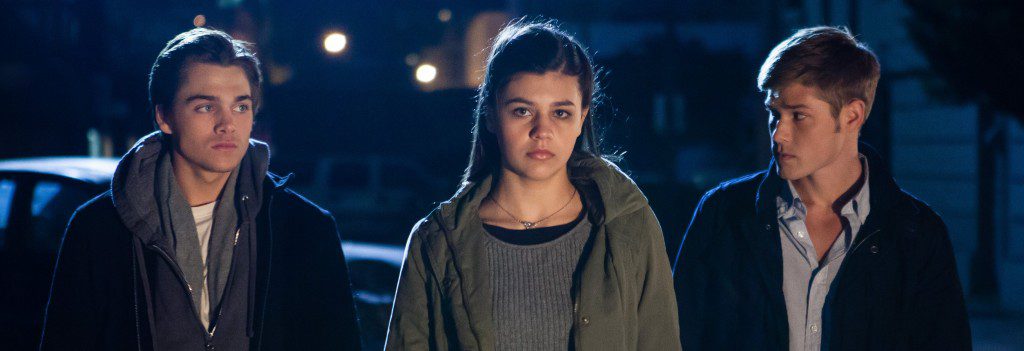 In the Bible, the devil waited until Jesus was in his thirties before tempting him and trying to lure him away from his divine mission in life. But these are more impatient times, so in Bless the Child, when it looks as if a six-year-old girl with special powers may be the Second Coming — her birth was heralded by the same star that shone over Bethlehem — a cult of nasty satanists abducts her and tries to bend her to their evil will.
In the Bible, the devil waited until Jesus was in his thirties before tempting him and trying to lure him away from his divine mission in life. But these are more impatient times, so in Bless the Child, when it looks as if a six-year-old girl with special powers may be the Second Coming — her birth was heralded by the same star that shone over Bethlehem — a cult of nasty satanists abducts her and tries to bend her to their evil will.
Poorly written, poorly acted and poorly directed, Bless the Child may be the worst film to come out of the recent wave of occult thrillers. But it also has remarkably good intentions, especially compared to, say, The Ninth Gate, which got lost in its high-toned camp; Stigmata, which used Catholic phenomena to promote Gnostic teachings; and End of Days, which was essentially a senseless Schwarzenegger shoot-em-up until, at the last-minute, the hero discovered self-sacrifice.
In contrast to those films, Bless the Child goes out of its way to show how prayer can rally the angels in a spiritual war, and it draws perhaps too neat a link between satanic theology and the fashionable do-what-you-want messages coming from self-empowerment movements. The element of sacrifice is missing from the story (or, at best, diluted), but at times the film feels like a Catholic variation on Frank Peretti’s This Present Darkness — and that may not be accidental.
Director Chuck Russell, better known for cheesy action films like The Mask and Eraser, was working on an adaptation of Peretti’s novel a few years ago but the studio, 20th Century Fox, pulled the plug. With Bless the Child, a loose adaptation of Cathy Cash Spellman’s novel (the book was rooted in Egyptian mythology, but there’s none of that in the film), Russell has told a story that strikes several Peretti-esque notes.
The problem is, the film has no sense of logic, internal or otherwise. The villains are simply too obvious; this is one of those films in which people behave the way they do because they know they are in a horror movie.
Bad guy Eric Stark (Rufus Sewell), for example, is supposed to be the celebrity leader of a fancy, wealthy cult-like movement, but does he live like one? No, not unless L. Ron Hubbard preferred dark, ominous dwellings surrounded by followers whose attire — bad hair, dark clothes, body piercings — is movie shorthand for “creepy”. And the nanny who works for him is a severe-looking crone; you know she’s up to no good when you see how furiously she knits with her pointy, pointy needles.
Evil in this film is anything but subtle; there is no recognition that it sometimes takes very attractive (or, alternatively, very ordinary) forms.
Elsewhere, stupid things happen just to produce an effect, and not because they make any sense. Why does the falling car blow up before it hits the water? Because it’s a movie, and the audience deserves to see explosions. Why do the bad guys put the head of one of their victims back on its body, thus frightening the heroine who discovers it, when they’re going to knock her out and hide the body anyway? Because it’s a movie, and the audience deserves to see at least one decapitated noggin roll across the floor.
The police, led by John Travis (Jimmy Smits), are also a pretty dim lot. They are investigating the deaths of four children, all of whom had cultic symbols burned into their flesh. The cops have evidently noticed that all four children were born on the same day; you would think the cops would start looking for other children with that birthday and place some bodyguards around them but no, that would make too much sense.
Things are confused further by the fact that the filmmakers can’t decide who the real main character is. Is it Cody (Holliston Coleman), the six-year-old messiah-in-waiting who can make plates spin and perform other tricks that belong more to the apocryphal gospels than to the canonical ones? Or is it her aunt Maggie O’Connor (Kim Basinger), the agnostic psychiatric nurse who raised her?
The storytellers can’t decide, nor can they decide who the real heroes ought to be; in the end, it takes angels from heaven and cops armed with guns and tear gas to stop Satan in his tracks. Imagine the denouement to Raiders of the Lost Ark with American troops riding in and saving the day instead of the Angel of Death, and you’ll get a sense of how messed-up this film is.
— A version of this review was first published in BC Christian News.












